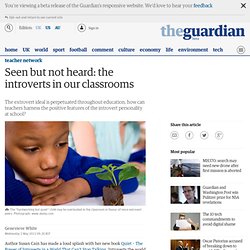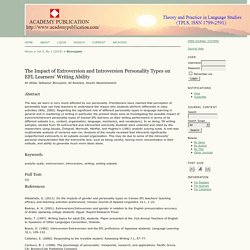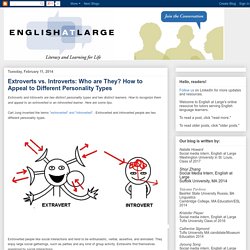

Understanding, Embracing & Celebrating The Introverted Student. Social, Emotional & Developmental Needs Of Introverts With the ever-growing focus on the social, emotional, and developmental needs of our students, there is no better time than now to highlight the gifts of our introverted students.

There is a social stigma, a host of myths, and a superficial blanket of beliefs about introverts. It is time to uncover the myths, remove the superficial blanket, and embrace our social behavioral diversities. Introverts & Extroverts Are Literally Wired Differently According to various studies, and as stated by Dan Buettner in Thrive via Psychology Today, the brain of an introvert vs. an extrovert is simply wired differently, with a greater or less need for the dopamine chemical. The front part of an introvert’s brain is most active and stimulated by his or her own thoughts.
Common Introvert Myths 1. 2. Quiet in the Classroom: The Power of Introverts in Learning. By Jacquie McGregor I came across a series of articles recently that made me rethink some of my philosophies as an educator.

A great deal of my time as a teacher has been spent in music classrooms. Band, choir, orchestra, jazz band, general music, guitar — you name it, I’ve taught it. These are the classrooms that we consider that proprietary domain of the extrovert: if a student wants to be involved in music, then obviously she wants to perform. An Introverted Student Is A Gift. Seen but not heard: the introverts in our classrooms.
Author Susan Cain has made a loud splash with her new book Quiet – The Power of Introverts in a World That Can't Stop Talking.

Introverts the world over have breathed a collective sigh of relief at Cain's reassurance that it is okay to choose a night at home with a good book over a dinner party invite, and that letting your phone go to voicemail doesn't necessarily make you a friendless misanthrope. Quiet celebrates the positive features of the introvert personality, while examining the way in which our society is geared up to celebrate and encourage extrovert personality traits.
As a result of this, introverts are placed in opposition to the extrovert ideal and risk being undervalued and overlooked. Cain argues that our celebration of the extrovert type begins in the classroom, where, from the start, young pupils are grouped facing each other in pods, and are praised by teachers for giving quick (rather than thoughtful or original) answers. Could you be one of our bloggers? Group idea generation. Group learning preferences. Introversion misunderstood. Personality type and student performance. Personality types and language learning strategies. Social positioning in the classroom. The Invisible Students in the Classroom How to Include the Intro. The Impact of Extroversion and Introversion Personality Types on EFL Learners’ Writing Ability. Alibakhshi, G. (2011).

On the impacts of gender and personality types on Iranian EFL teachers’ teaching efficacy and teaching activities preferences. Iranian Journal of Applied Linguistics 14.1, 1–22. Badran, A. H. (2001). Extroversion/Introversion and gender in relation to the English pronunciation accuracy of Arabic speaking college students. English At Large : Extroverts vs. Introverts: Who are They? How to Appeal to Different Personality Types. Extroverts and Introverts are two distinct personality types and two distinct learners.

How to recognize them and appeal to an extroverted or an introverted learner. Here are some tips.Carl Jung invented the terms "extroverted" and "introverted" . Introverts in an Extroverted World. I have been rethinking my policy towards participation in class.

My policy has always stated that students need to find some way to add to the class discussion. I tell them that they should plan to speak at least once during class. When I observe other faculty teaching, I look for the level and quality of participation in their classes. However, as in many other cases, my own experience as a parent has led me to question my long-held beliefs about my approach to participation.
Last year during parent-teacher conferences, my daughter’s teacher told me that I had a bright child who has a lot to offer the other students in the class, but she rarely raises her hand and, when called on, talks only in a soft, barely audible voice. The effect of personality on the English as foreign language learners’ performance on listening comprehension: extroverts vs. Introverts. To cite this paper:Araghi SM, Fam A and Ziaei E. 2012.

The effect of personality on the English as foreign language learners’ performance on listening comprehension: extroverts vs. Dear Introverts, (An Honest Letter from an Extrovert) Dear Introverts*, I was brushing my teeth the other night (this is when I do some of my best thinking), when I realized: almost everyone I’m close to is an introvert.

Mouth full of foamy paste, I looked at Varun in surprise, “Varun! Almost all of my close friends are introverts. What are the odds? How does this happen? (How typically extrovert of me: a whole paragraph about myself and so little written to you, my beloved introverts). Let me start by saying, I’m sorry. My first #elt chat: a summary.